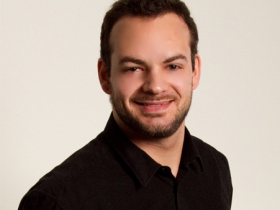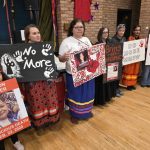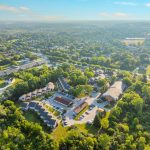Jabril Faraj
"If we continue to leave a large portion of our city behind, we will never be able to realize Milwaukee’s full potential."

I think Milwaukee’s future is largely undetermined. I believe we have a ton of potential – something we’re already seeing manifest itself – but I also believe we have to make sure that those opportunities don’t stay limited to the East Side and Downtown.
What is your job and its responsibilities?
Right now, I’m working as an independent journalist. I’ve been unemployed for the last six and a half months and, over that time, I’ve taken up a project I’m very passionate about. Over the course of the past four months I’ve traveled the streets and neighborhoods of Milwaukee meeting regular, everyday people and sharing their personal stories via milwaukeestories.org. Everyone has a story and, as Milwaukee is the most segregated large metro area in the country, I believe that beginning a dialogue about what life is like for the people who live here is an important step in creating real, substantial, long-lasting change.
How long have you lived in Milwaukee & what brought you here?
I’ve spent my entire life in Milwaukee, growing up in Riverwest and attending MPS Riverside High School before heading off to college. I returned in 2010 to get my feet underneath me after graduating in the midst of the Great Recession. I was quickly pulled into a Milwaukee I hadn’t know – a Milwaukee that was fun and vibrant – while attending NEWaukee events and meeting other enthusiastic young professionals. As time went on, however, I became increasingly aware of other issues, such as, “What are the implications of raising my three-year-old daughter (who is mixed-race) in a state an Annie E. Casey Foundation study recently said was the worst to raise a black child?”
Is there an issue you believe all Milwaukeeans should turn our attention to?
The biggest issues we face are the social and racial divisions we see – and are, often, easy to disregard – on a daily basis. While opportunities abound for a section of our population that’s thriving, the minority communities that make up much of the city proper continue to face the realities of underemployment, under-education and over-incarceration while being forced to navigate the city using an under-funded and constantly shrinking public transportation infrastructure. This glaring dichotomy is unacceptable in the 21st century and I believe it is our responsibility to address it.
We’re very friendly here – it’s easy to have a great conversation with a complete stranger or to find a “friend for the day” at one of the summer street festivals or another event – but, when it comes to business, I’ve found that, more often than not, we’re not very open to collaboration. If we’re going to address the social issues in our community or be able to put Milwaukee on the map nationally, we’re going to have to do it together. This means putting our own egos and pride aside so we can achieve something greater. If we want to do great things as a city we need to stop fighting amongst ourselves. In the end, a collaborative business environment, non-profit sector and community spirit can only benefit everybody.
What is the most effective way to implement change in Milwaukee?
The most effective path to true change is through dialogue and cooperation. Only when we are able to have a genuinely open, diverse dialogue about the issues that are important to the many groups we have here will we be to determine what the most important issues are and be able to come together to achieve them. This also means: we can’t sit back and wait for change to happen. We have to get involved, live it out, be the change that we want to see, both at work and in our relationships and activities. It’s not going to happen overnight but, after all, nothing worth having is ever easy.
Where do you see Milwaukee in 5 years?
Honestly, I don’t know. I think Milwaukee’s future is largely undetermined. I believe we have a ton of potential – something we’re already seeing manifest itself – but I also believe we have to make sure that those opportunities don’t stay limited to the East Side and Downtown. If we continue to leave a large portion of our city behind, we will never be able to realize Milwaukee’s full potential. I want to see Milwaukee invest in transportation, good public education and a healthy middle class. If we can start moving in the right direction now we have the ability to make Milwaukee not only a great place to start your life and career but a great place to stay, as we mature in both.
Newaukeean of the Week
-
Dan Panozzo
 Oct 28th, 2019 by Newaukee
Oct 28th, 2019 by Newaukee
-
Olivia Menzia
 Oct 21st, 2019 by Newaukee
Oct 21st, 2019 by Newaukee
-
Israel “Izzy” Lugo
 Oct 7th, 2019 by Newaukee
Oct 7th, 2019 by Newaukee





















I think that Jabril puts into words what many of us think. The disconnect between well meaning people in the Hispanic, Afro-American and White community is still apparent. This disconnect, in my opinion, comes from a build up of misunderstanding, mistrust and, frankly, exhaustion.
The politicized atmosphere of majority minority city surrounded by mostly all white enclaves bears more than casual comparison to a city under siege.
This city is at the mercy of a state government that has no real concern for our success. Liken it to a kid thrown into the deep end of the pool in order to teach him how to swim.
I read daily articles about cities all over the country who have shed their labels and reinvented themselves by investing in their infrastructure, education and public relations in order to improve the quality of life for all of their residents. This investment provides a desirable atmosphere for business to invest and grow. We need Transit, Education and Jobs to turn this city around. By investing in our city we can create an atmosphere of trust and opportunity to all of our residents. Now where do we find the leadership that can organize the disparate population in a focus drive to achieve these objectives?